Toyota Corolla Review 2024
Written by Andrew Brady
Quick overview
Pros
- Efficient hybrid hatch with strong performance
- Well equipped with a high quality interior
- Improved infotainment from 2023
Cons
- Other hatchbacks are more practical when it comes to boot space
- No diesel in the range for high-mileage drivers
- The new Honda Civic is also very good
Overall verdict on the Toyota Corolla
“The Toyota Corolla is a family hatch that fights the Volkswagen Golf and Honda Civic for the title of best in class. Hybrid technology means it’ll be cheap to run, while improvements to the interior mean you don’t have to compromise on comfort or style, either. We rate it very highly, as you’ll read in our Toyota Corolla review.”
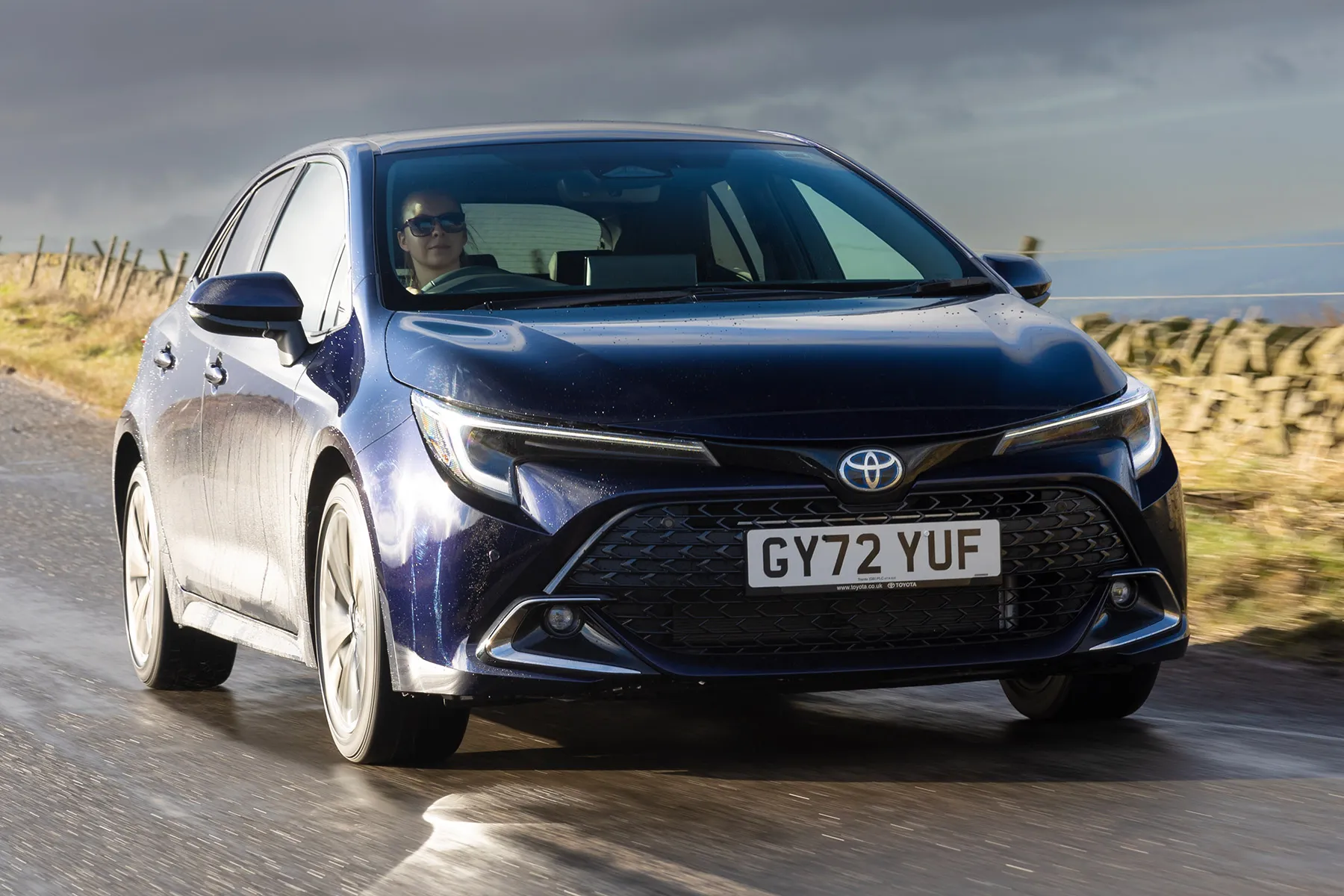
Toyota has been pioneering hybrid cars for decades now. There was a time when buying one meant compromises, but today two of the best hatchbacks just happen to feature hybrid power. If you’ve got this far, we suspect the biggest challenge in your car search will be choosing between the Toyota Corolla and new Honda Civic. Read our Toyota Corolla review to help you decide.
Launched in 2019 (to replace the dull-but-dependable Toyota Auris), the latest Corolla was given a nip-and-tuck in 2023 to keep it looking fresh against the competition. The changes aren’t visibly significant, though - you’d have to look very closely to spot the difference between the latest Corolla and a pre-facelift model.
The big news was the introduction of Toyota’s fifth-generation hybrid powertrain, which in straightforward terms means a power boost for both the 1.8- and 2.0-litre engines. There was also a larger, slicker infotainment screen inside, while a new digital instrument cluster completed the tech-focused overhaul.
Whether you buy a pre- or post-facelift Toyota Corolla, you can expect very low running costs. The majority of buyers go for the 1.8-litre hybrid motor, which is capable of up to 64.2mpg. If hybrid power doesn’t appeal, the Corolla was briefly offered with a simple 1.2-litre petrol engine. That’s fine if you’re on a budget but it does kinda miss the whole point of the Corolla.
It’s not just the Toyota Corolla’s low running costs and unshakeable reliability that make it such a hit with private buyers and Uber drivers alike. It’s also very relaxing to drive, helped by an engine that switches off entirely in stop-start traffic. You’ll barely notice it kick in, either, while there’s enough performance on hand for motorway driving. The 196PS 2.0-litre feels very punchy indeed but we wouldn’t necessarily hunt one out over the smaller engine - the 140PS 1.8 is more than adequate.
There are four trim levels available: Icon, Design, GR Sport, and Excel. While the Toyota Corolla’s £30,000 plus start price looks pretty punchy, you do get a lot of standard equipment for your cash. This includes the new 12.3-inch digital instrument cluster, a 10.5-inch navigation system, heated front seats and a reversing camera. You get an extensive range of Toyota Safety Sense active driver-assistance kit, too.
Other than the price, there’s little going against the Toyota Corolla. The Honda Civic is much more practical but, if you need more space, there's an impressive estate in the shape of the Toyota Corolla Touring Sports.
Looking for a used car for sale? We've got 100s of Toyota Approved Used Cars for Sale for you to choose from, including a wide range of Toyota Corolla cars for sale.
Is the Toyota Corolla right for you?
If you're looking for a cheap-to-run family hatch, the Toyota Corolla is a great choice. A lot of buyers would now prefer SUV alternatives like the Toyota RAV4 but there's still a lot going in the Corolla's favour. It's very comfortable, has a high-quality interior and will be very reliable. In short, it's pretty much the ideal hatchback.
What other cars are similar to the Toyota Corolla?
If you want a hatchback family car there’s no shortage of quality to choose from. The new Honda Civic is one of our favourites, while the old 2017 Honda Civic is a thoroughly sensible used car purchase. The latest Volkswagen Golf is a quality hatch and should be on your radar, too, while the ever-popular Ford Focus has been recently updated and represents excellent value for money. We'd also look at the versatile Skoda Octavia, while the Mazda 3 is a left-field choice with desirable looks and a superb cabin.
Comfort and design: Toyota Corolla interior
"The Corolla is spacious inside for a hatchback this size. Even taller drivers who can sometimes feel cramped in a hatch this size will have no issues with the Toyota. The seats are really comfortable with plenty of side support, which you’ll appreciate during longer journeys."
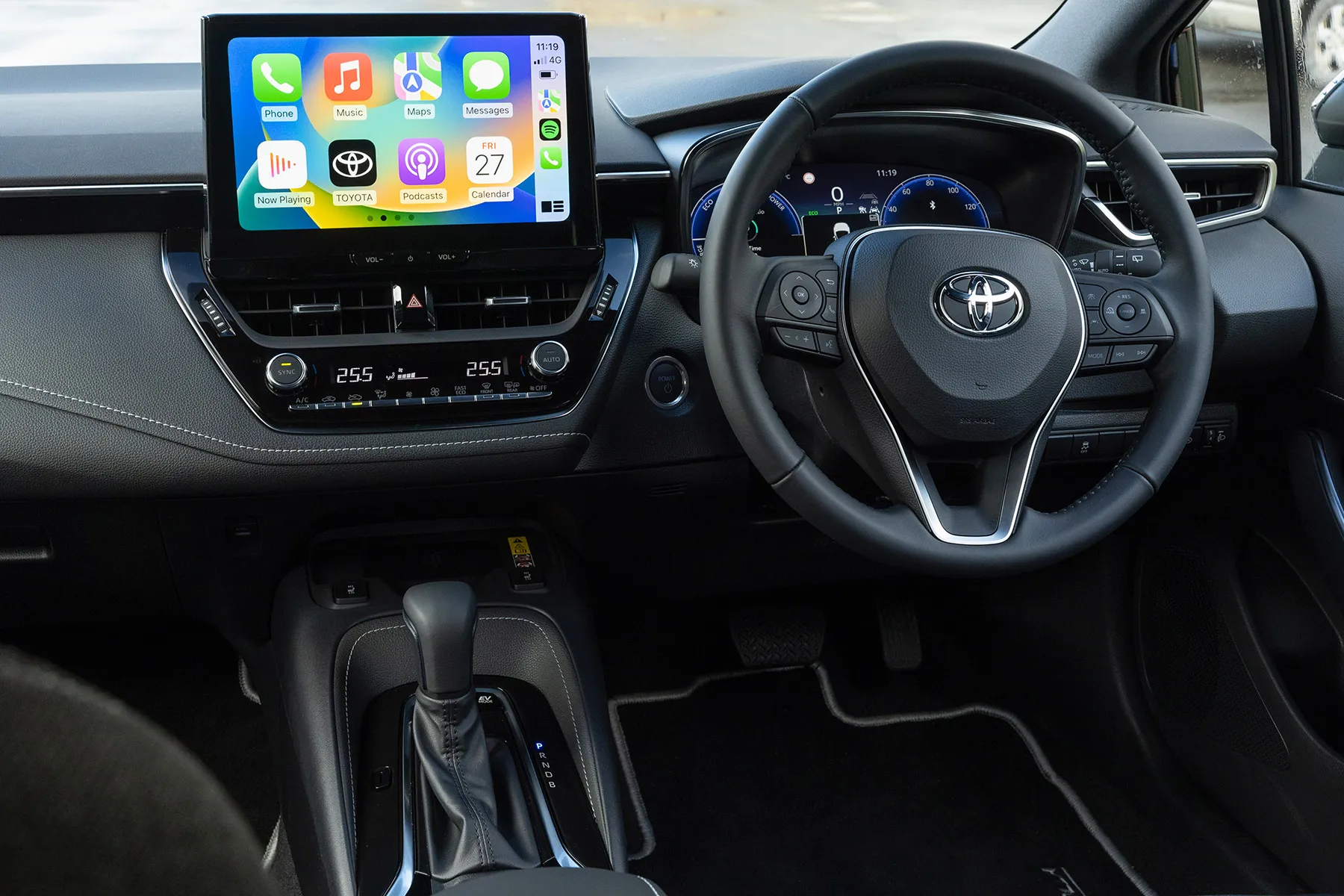
The Toyota Corolla's cabin looks lovely too, relatively simple but effective and with that much-lauded sense of solidity, even down to the thunk that the doors make when you close them. Again though, it’s not perfect - why Toyota insisted on using ‘90s style rocker switches and LCD panels on earlier cars remains a mystery. However, the Corolla feels as nice as a Golf or a Focus, with soft-touch materials, yet it's still hard-wearing and solid.
We'd recommend looking for a later Toyota Corolla if you can. The 2023 update brought with it a slightly revised interior, including a smarter infotainment system (ridding the dash of those naff looking buttons in the process). There's a new digital instrument cluster, too, which looks a lot more modern than the old part-digital system it replaced.
Even the most affordable Toyota Corolla models look and feel pretty smart, although you do get some nice-to-have features if you splash the cash on one of the pricier trim levels. The Corolla Design, for example, comes with interior ambient lighting and an auto-dimming rear-view mirror. The GR Sport, meanwhile, feels noticeably sportier - part-leather sport seats are standard as well as red contrast stitching around the rest of the interior.
Quality and finish
This is one area where the Toyota Corolla is head and shoulders above its Auris predecessor. Toyota has always made well engineered and solid cars, but interiors have never been a strong point. However, it’s really upped its game with this Corolla.
There are no cheap plastics, even if you go looking in out-of-the-way places, while the finish is top notch. So instead of clunky buttons and rough plastics, you get something that feels far more premium. There are no squeaks or rattles and all the buttons and controls feel solid. We’re not entirely convinced by the little buttons that flank the touchscreen on earlier models, but that’s a minor gripe that was fixed in 2023.
Infotainment: Touchscreen, USB, nav and stereo in the Toyota Corolla
When the Toyota Corolla first went on sale in 2019, the infotainment system was its biggest weak point. Its eight-inch screen looked dated, was clumsy to operate and you couldn’t even bypass the irritating menus by mirroring apps from your phone. A hasty update towards the end of 2019 saw the introduction of Apple CarPlay and Android Auto but it still wasn’t as slick as systems found in rivals.
The latest Toyota Corolla finally has the infotainment system the original car deserved, with the same 10.5-inch display as the Toyota bZ4X electric SUV. It’s worth looking for a later car for this alone, although it’s still not perfect. While it’s quicker (and easier) to operate, we find the display in the Ford Focus to be more user-friendly. It doesn’t help that the screen has been plonked on the dash, either, with no attempt to angle it towards the driver.
On the plus side, the 2023 update saw the Toyota Corolla fitted with impressive digital dials behind the steering wheel. These are bright and clear to read, while looking much more modern than the old part-digital display.
Space and practicality: Toyota Corolla boot space
While space is important, it's the way this space is utilised that's more crucial to many, and a weak point in the Corolla is the boot. It's not the actual boot space itself that's the issue with the Toyota Corolla - that's actually a decent size at 361-litres which is more than a Ford Focus and not far short of a Volkswagen Golf.
The issue is with the rear design of the Corolla and in particular the angle of the tailgate. While it makes for a swoopy looking rear end look, it means you have to lean forward to get to the boot, which is further hindered by an oddly big back bumper.
Another consequence is that it's quite hard to shut the boot in one movement. The shape and angle mean it's hard to push down from the outside while the inner handle requires some Houdini-esque joint movements in your wrist, and there's no powered tailgate option for the Corolla hatch either. A Honda Civic is far more practical in this respect.
The rear seats fold down but it's not a flat floor and there are intrusions from the side which mean it's not that easy to carry big or boxy things home from Ikea. That combined with a high load lip makes this a not especially user-friendly cargo area. There are also non-existent rear door pockets, replaced instead by a cupholder.
The Toyota Corolla's dimensions are 4370mm long and 1780mm wide, while if you like the sound of the Corolla but want a bigger boot, then take a look at the Toyota Corolla Touring Sports, the estate version of the Corolla.
Handling and ride quality: What is the Toyota Corolla like to drive?
"Plenty of hybrids suffer from crashy ride quality because of the necessity to stiffen the suspension to deal with the system’s extra weight, but the Corolla all-but eradicates that."
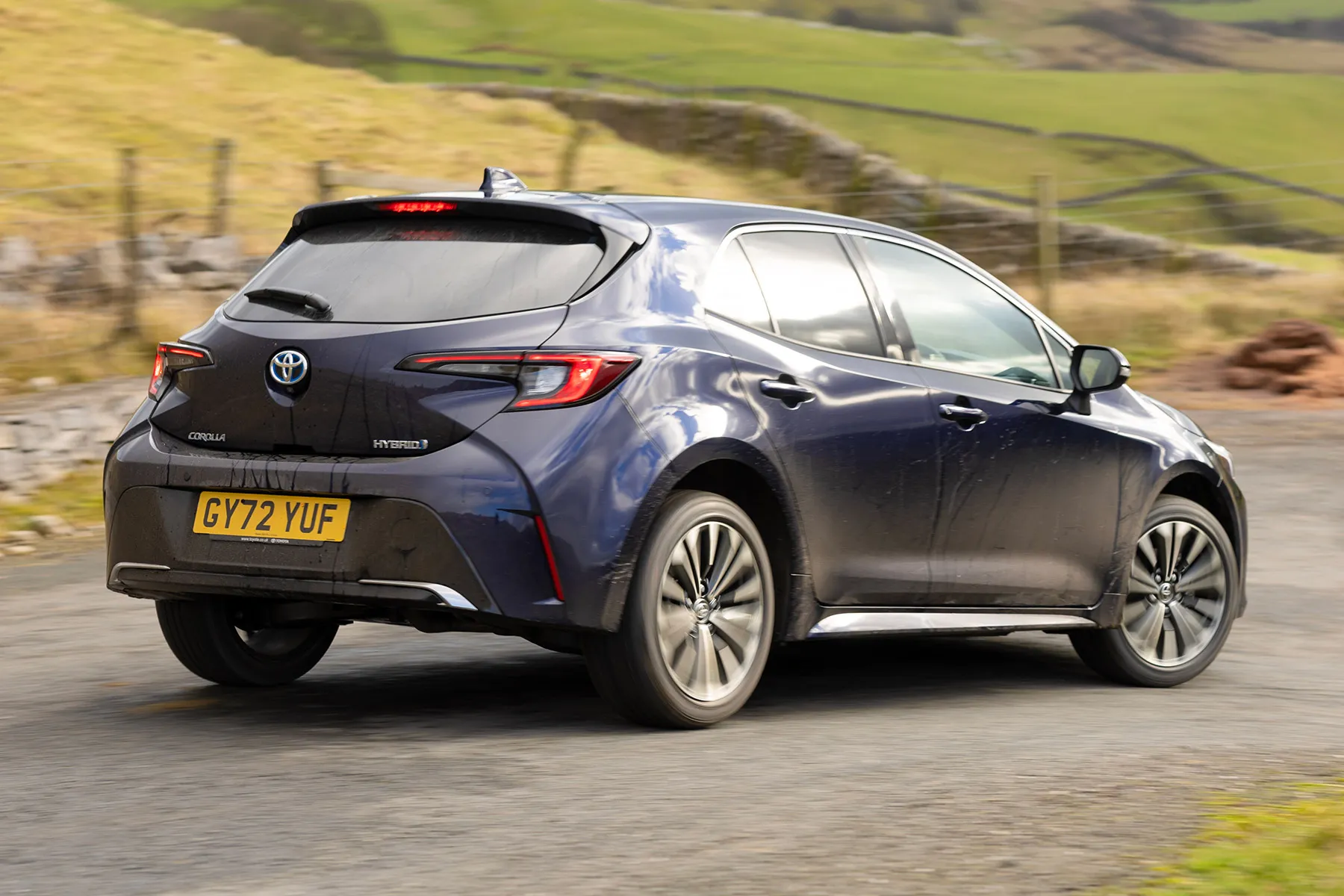
In addition, light steering and a general sense of refinement - the sort that just can’t be attained in the average chuntering diesel hatchback - make the Toyota Corolla a very pleasant place to be. Especially at low speeds.
Visibility is great for around-town driving while there are lots of assistance features on hand, too. Even the most affordable Toyota Corolla models come with front and rear parking sensors as well as a reversing camera. It's a very unintimidating car to drive.
It's not out of its depth on rural roads, either. In fact, we'd go as far as saying the Toyota Corolla handles very well - its low centre of gravity helps reduce body roll, while there's a reassuring amount of grip. Sure, the communicative steering in a Ford Focus might appeal to keen drivers, but we have few complaints about how the Toyota Corolla corners.
What engines and gearboxes are available in the Toyota Corolla?
Toyota has long been the champion of hybrid technology and that shows in the Toyota Corolla. It's smooth, quiet and quick. Thanks to the electric power motor, there’s instant power away from a standstill and the engine comes on song so quietly that it’s almost imperceptible in normal driving. Yes it can drone when you really plant your right foot, but even then it’s never coarse.
The 1.8-litre hybrid is the mainstay of the range and we think it’s the best in the line-up. The standard 1.8 rarely feels short of power, even though early models only had 120PS - only moderately more than a 1.0-litre Volkswagen Golf. Power was boosted in 2023, with the 1.8-litre hybrid now producing a more respectable 140PS. It feels sprightlier than before, accelerating to 62mph in 9.7 seconds (nearly 2.0 seconds quicker).
There is merit to the 2.0-litre though. With 196PS (or 180PS in earlier models) it’s much more responsive, while the extra power means you don't have to deal with the gearbox noise for as long when building speed.
The necessity of a CVT-type gearbox in these things means you’ll never get as much enjoyment from a hybrid Corolla as you will from a well-set-up turbocharged petrol car with a twin-clutch automatic – a TSI and DSG equipped Volkswagen Group car, say. But the 2.0 hybrid Corolla is the closest any hybrid has ever come. And a CVT is likely to be much more reliable.
There was also an entry-level 116PS 1.2-litre petrol-only base model but this was discontinued in 2019. Only one in every 13 Toyota Corolla’s sold was powered exclusively by petrol, hence why it was quietly dropped.
Refinement and noise levels
Thanks to the electric motor that powers the Toyota Corolla at low speeds, it’s very refined around town and when the engine does kick-in, it’s so smooth it’s barely noticeable. It makes the Corolla one of the most refined cars around town this side of a pure-electric vehicle.
Of course, this isn’t just about noise. The Corolla does a superb job of insulating the cabin from the vibrations and jolts caused by poor roads thanks to the excellent suspension set-up. Get up to motorway speeds and there’s little wind or tyre noise either, making for very relaxed long distance progress.
And what of that CVT-resultant drone you often get with hybrids? Well yes, the engine can be a bit loud during acceleration but the noise isn’t particularly intrusive, and you soon learn not to mash the accelerator to the floor unless you absolutely have to.
Safety equipment: How safe is the Toyota Corolla?
All Corolla models come with Toyota's Safety Sense which has a pre-collision system, automatic high beam, lane departure alert, lane trace assist, sway warning and road sign assist. No surprise then that the Corolla was awarded the maximum five star rating in 2019 by crash test experts Euro NCAP.
The Safety Sense system was improved when the Toyota Corolla was updated in 2023. It now benefits from over-the-air updates, which means the software can now be upgraded automatically without needing to visit a dealership. There's also a new front camera which covers a wider field, while the distance of forward detection has been increased. That means it can detect potential collisions further in advance.
Even so, if you want the full suite of safety kit available with the Corolla, you have to look to the luxury Excel trim that comes with adaptive headlights, blind spot monitor, and rear cross traffic alert.
MPG fuel costs: What does a Toyota Corolla cost to run?
"With hybrid power, the Toyota Corolla should be one of the cheapest family cars to the run. You can expect diesel-like fuel economy from the Corolla, not to mention an unshakeable reliability record."
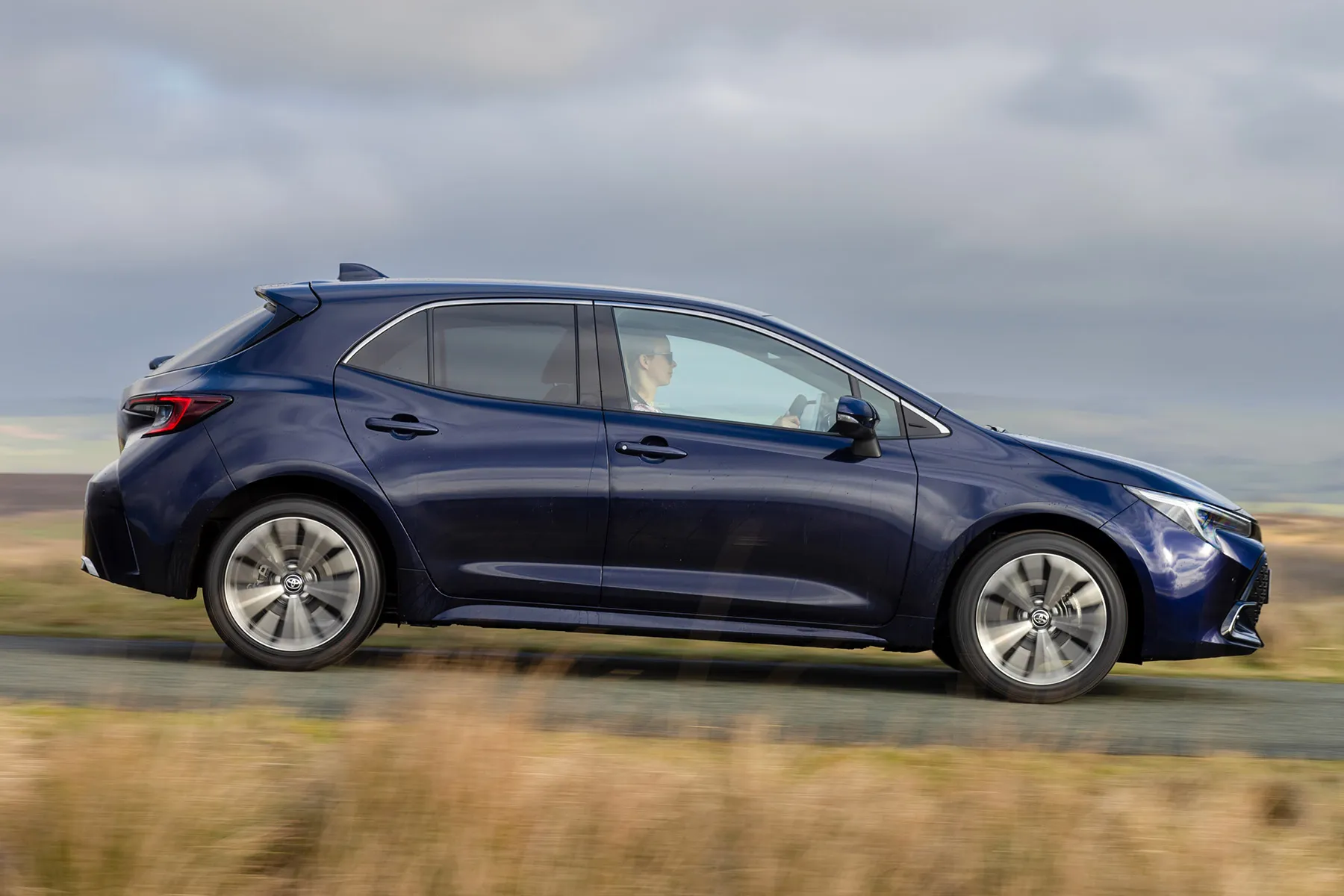
The official fuel economy figure for the Toyota Corolla depends on which size wheels are fitted - the entry-level Corolla Icon is technically the most efficient, capable of up to 64.2mpg according to WLTP fuel economy tests. The figure for the 2.0-litre hybrid engine is 62.7mpg, while our experience suggests that Toyota hybrids perform pretty well in the real world, too. That means you should be able to get pretty close to those figures.
While you should look for a Toyota Corolla Icon if impressive fuel economy is your number one requirement, we suspect the difference in efficiency between the different trim levels is negligible. The Corolla Excel and Sport officially return up to 60.1mpg with the 1.8 engine, while the 2.0-litre is slightly better on 61.4mpg.
Don't want a hybrid? The now-discontinued Toyota Corolla 1.2-litre petrol is good for around 47.0mpg.
How reliable is the Toyota Corolla?
If you're looking for a reliable car, then you're not going to go wrong with a Toyota Corolla. As a manufacturer, Toyota enjoys an excellent reputation for reliability while the brand's been producing hybrid cars longer than most manufacturers. The Toyota Corolla doesn't appear to have any common issues reported since it arrived in 2019.
If that's not enough to convince you, Toyota's warranty can be extended for up to 10 years or 100,000 miles free of charge (provided you have the car serviced as a Toyota main dealer).
Insurance groups and costs
If you crash a Toyota Corolla, its complex hybrid system means it might cost a little more to repair than, say, a straightforward petrol Vauxhall Astra. That means it's ranked in slightly higher insurance groups - starting from group 18 for a 1.8-litre Excel and rising to group 22 for the 2.0-litre.
If you're a new driver, we'd recommend looking for an older Toyota Corolla with the 1.2-litre petrol engine. With its lower power output, this should be slightly cheaper to insure - although, as ever, it's worth shopping around for insurance quotes before paying a deposit on a new car.
VED car tax: What is the annual road tax on a Toyota Corolla?
Buy a hybrid Toyota Corolla and you'll qualify for a £10/year discount on your annual road tax - making a total bill of £180 each year (compared to £190 for non-hybrid alternatives). If you're looking for free road tax, you'll need a pure-electric alternative like the new Toyota bZ4X. That's a loophole that'll shortly be closed, however.
First-year road tax for the Toyota Corolla falls between £175 and £220 depending on the engine and trim you choose.
It's impossible to spend more than £40,000 on a new Toyota Corolla so you aren't in danger of being hit by the hefty £410 annual surcharge for premium cars.
How much should you be paying for a used Toyota Corolla?
"As you can no longer buy a new Toyota Corolla with an entry-level petrol engine, it's not as affordable as more conventional competitors like the Volkswagen Golf and Ford Focus."
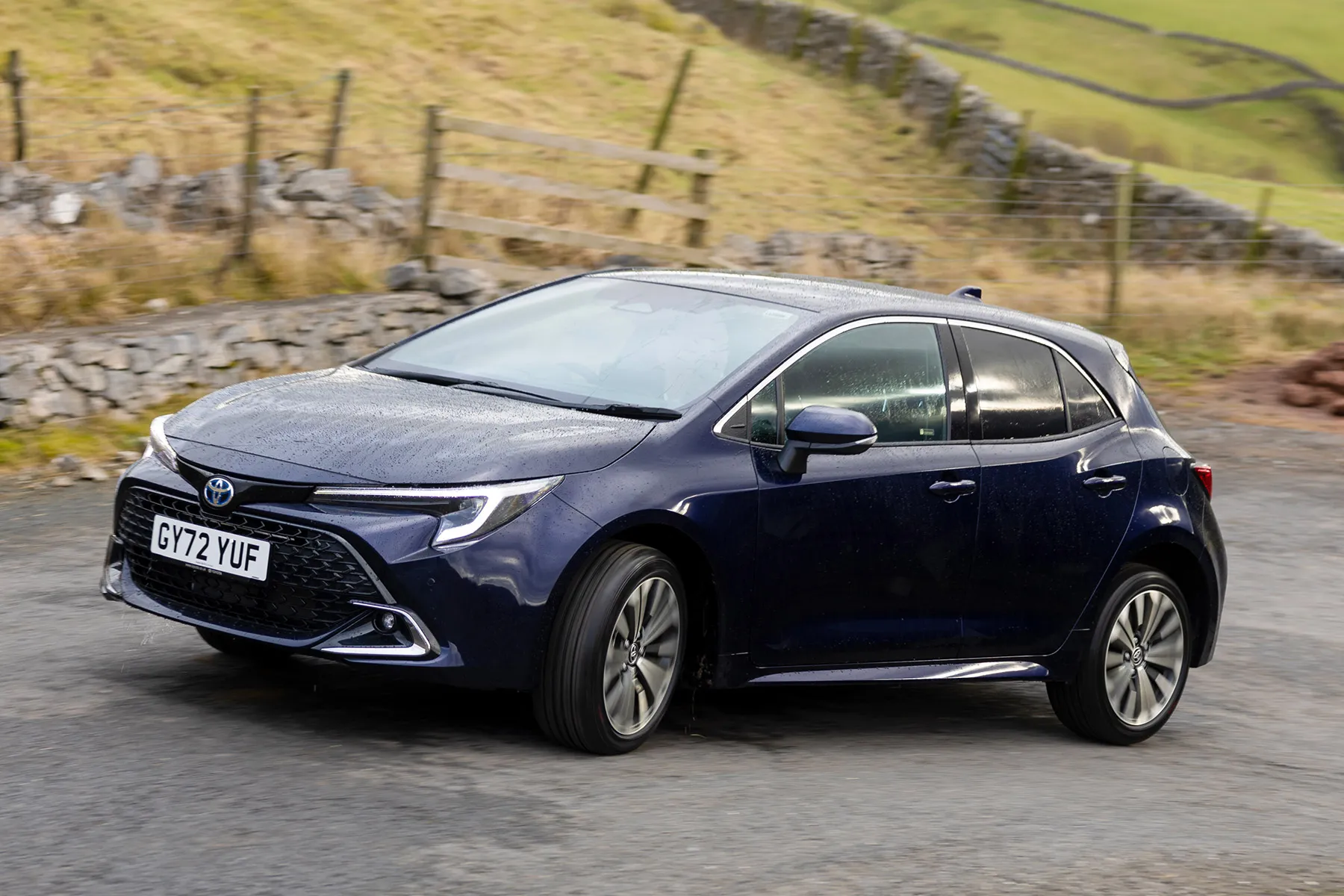
The range starts new from a little over £30,000 for the Toyota Corolla Icon with the 1.8-litre hybrid engine, while the 2.0-litre is nearly £32,000. The most expensive Toyota Corolla hatchbacks are more than £35,000 when new.
The good news, though, is that a generous standard equipment list means the Corolla isn't really any pricier than rivals when compared like-for-like. And, of course, you can save cash by searching for a secondhand Toyota Corolla.
You can buy a used Toyota Corolla on heycar for as little as £13,500. That'll get you an early example from 2019 with the 1.2-litre petrol engine, while used hybrid models start from around £14,500. If you'd prefer a facelifted car, £20,000 is what you'll need to spend.
Trim levels and standard equipment
In the Toyota Corolla line-up, buyers can choose from four trim levels: Icon, Design, GR Sport and Excel. All are well-equipped - there isn't really a properly basic Toyota Corolla - so we'd advise against spending top money on one of the pricier models.
The Toyota Corolla Icon kickstarts the range with 16-inch alloy wheels and LED headlights. Inside, the new 12.3-inch digital instrument cluster is standard, as well as the 10.5-inch navigation system. Icon models also get a wireless phone charger, keyless entry and start, dual-zone air con, a reversing camera, front/rear parking sensors with automatic braking, heated front seats, over-the-air updates and Toyota's Safety Sense active safety systems.
The Toyota Corolla Design looks a bit swisher thanks to 17-inch alloy wheels, LED dual-beam headlights and rear privacy glass. The Design also comes with folding door mirrors and rain-sensing wipers, while inside you'll find ambient lighting and an auto-dimming rear-view mirror.
Looking for a Corolla with sporting pretensions? You'll need the Toyota Corolla GR Sport. This adds 18-inch black, machined alloy wheels, a dark chrome lower grille and black door mirror casings. For the ultimate in headturning looks, the GR Sport is available with a bi-tone paint finish. Inside, the Corolla GR Sport comes with sports seats with red contrast stitching and GR Sport logo embossed on them, plus red stitching on the steering wheel and shift lever.
Topping the range, the Toyota Corolla Excel builds on the Design with 18-inch dark grey and machined alloy wheels, adaptive high-beam headlights and multi-beam LED headlights. The Corolla Excel also gets black Alcantara upholstery, a head-up display, blind spot monitor, rear cross-traffic alert and a clever safe exit assist feature. Bi-tone paint is available as an option on the Corolla Excel as well as a panoramic sunroof.
When it was first launched, this generation of Corolla was also offered with the Icon Tech trim that brought Touch and Go sat-nav, intelligent park assist, parking sensors, and a 7.0-inch information screen.
Ask the heycar experts: common questions
Is the 2023 Toyota Corolla a good car?
Which is the best Toyota Corolla model?
What is the difference between the Toyota Corolla and the Corolla Verso?
Get our latest advice, news and offers
Keep me updated by email with the latest advice, news and offers from heycar.
By submitting you agree to our privacy policy



